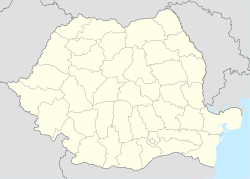Dierna (castra)
| Dierna | |
|---|---|
| Alternative name(s) | Tierna[1] |
| Known also as | Castra of Orșova |
| Founded during the reign of | Trajan |
| Place in the Roman world | |
| Province | Dacia |
| Administrative unit | Dacia Apulensis |
| Administrative unit | Dacia Superior |
| Directly connected to | Praetorium |
| Structure | |
| — Stone structure — | |
| Size and area | 64 m × 54 m (0.35[2] ha) |
| Stationed military units | |
| — Legions — | |
| — Cohorts — | |
| I Brittonum milliaria[3] | |
| Location | |
| Coordinates | 44°44′18″N 22°24′28″E / 44.7382°N 22.40764°E |
| Altitude | 85 m (279 ft) |
| Town | Orșova |
| County | Mehedinți |
| Country | |
| Site notes | |
| Condition | Ruined |
Dierna was a city and fort in the Roman province of Dacia, located near and beneath the present-day town of Orșova, Romania. The vicus of the fort later grew into a city.
The Roman city is today 6 m beneath the Danube after the Iron Gates Dam raised the water level.[4] Drawings from the 18th century show that Roman Dierna had a military port near the fort and an extensive civil port along the banks of the Danube. The Roman settlement at the confluence of the river Cerna with the Danube developed as a result of the port that was established here probably in the Flavian dynasty when the two fleets that controlled river navigation were created: Classis Flavia Pannonica and Classis Flavia Moesica.[5][6]
Epigraphic records indicate that the Roman settlement prospered especially from the collection of customs and Danube crossing taxes due to its strategic position and became a municipium under Septimius Severus.[7]
The Roman fort also had its own wharf, separated from the rest of the port by walls as are found at other Roman forts on the Danube.[8]
Coins of emperor Gratian (r.375–383) indicate the town continued to function after the Roman withdrawal from Roman Dacia in 271.[9]



See also
[edit]External links
[edit]- Roman castra from Romania - Google Maps / Earth Archived 2012-12-05 at archive.today
Notes
[edit]- ^ Schütte, Gudmund (1917). "Ptolemy's maps of northern Europe, a reconstruction of the prototypes". The Royal Danish Geographical Society. Retrieved 2013-05-04.
- ^ "Descoperiri Arheologice din Banatul Românesc, de Prof.univ.dr.Sabin Adrian Luca" (PDF). Archived from the original (PDF) on 2011-07-22. Retrieved 2011-08-01.
- ^ a b c Dierna
- ^ Timoc Calin 2008, Studii de Istorie a Banatului (XXXII-XXXIII) University of Timisoara 2008-9
- ^ Em. Condurachi, Classis Flavia Moesica au ler siecle de n.e., în Actes du Ixe Congres International d'etudes sur les frontieres romaines, Bucureşti, 1974, p. 84
- ^ Oct. Bounegru, Comerţ şi navigatori la Pontul Sting şi Dunărea de Jos, Mangalia, 2002, p. 44.
- ^ Radu Ardevan, Dierna - toponymie et histoire, în Roman Limes on the Middle and Lower Danube, Belgrad, 1996, p. 91-97.
- ^ Călin Timoc, Einige Bemerkungen über die Übergangspunkte auf der Donau zwischen Moesia Superior und Dakien, în Die Archäologie und Geschichte der Region des Eisernen Tores zwischen 106- 275 n.Chr., Bucureşti, 2001, p. 36-37
- ^ Moisil, Delia (2002). "The Danube Limes and the Barbaricum (294–498 A.D.) – A Study In Coin Circulation". Histoire et Mesure. 17 (3). Paris: École des hautes études en sciences sociales. ISSN 0982-1783. p 79-120
44°44′18″N 22°24′28″E / 44.73833°N 22.40778°E

